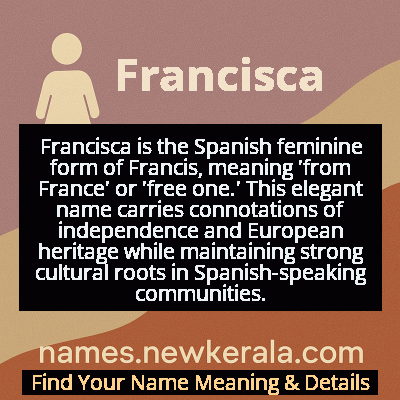Francisca Name Meaning & Details
Origin, Popularity, Numerology Analysis & Name Meaning of Francisca
Discover the origin, meaning, and cultural significance of the name FRANCISCA. Delve into its historical roots and explore the lasting impact it has had on communities and traditions.
Name
Francisca
Gender
Female
Origin
Spanish
Lucky Number
2
Meaning of the Name - Francisca
Francisca is the Spanish feminine form of Francis, meaning 'from France' or 'free one.' This elegant name carries connotations of independence and European heritage while maintaining strong cultural roots in Spanish-speaking communities.
Francisca - Complete Numerology Analysis
Your Numerology Number
Based on Pythagorean Numerology System
Ruling Planet
Moon
Positive Nature
Diplomatic, friendly, artistic, empathetic.
Negative Traits
Over-sensitive, moody, indecisive, prone to self-pity.
Lucky Colours
Green, cream, white.
Lucky Days
Monday.
Lucky Stones
Pearl, moonstone.
Harmony Numbers
1, 3, 4.
Best Suited Professions
Diplomats, mediators, caregivers, artists.
What People Like About You
Cooperative spirit, friendliness, artistic talent.
Famous People Named Francisca
Francisca Valenzuela
Singer-songwriter and poet
Chilean-American musician known for her Latin Grammy nominations and feminist activism
Francisca Lachapel
Television host and actress
Dominican-born winner of Nuestra Belleza Latina 2015 and co-host of Despierta América
Francisca Subirana
Missionary and educator
Spanish missionary who founded schools for girls in Equatorial Guinea
Francisca Nneka Okeke
Physicist and academic
Nigerian physicist awarded the L'Oréal-UNESCO For Women in Science Award in 2013
Name Variations & International Equivalents
Click on blue names to explore their detailed meanings. Gray names with will be available soon.
Cultural & Historical Significance
During the colonial period, Francisca spread throughout Latin America, where it became associated with both religious devotion and cultural identity. The name maintains a classic elegance while adapting to modern sensibilities, making it a bridge between traditional Hispanic heritage and contemporary values. In many Latin American countries, Francisca represents the strong matriarchal figures who have historically held families and communities together, while also embracing progressive ideals of female empowerment and education.
Extended Personality Analysis
Women named Francisca are often perceived as possessing a unique blend of strength and compassion. They typically exhibit strong leadership qualities combined with deep empathy, making them natural caregivers and community builders. Franciscas are known for their practical wisdom and ability to navigate complex situations with grace and intelligence. Their inherent sense of freedom and independence often manifests as creative thinking and innovative problem-solving.
At the same time, they maintain strong connections to family and tradition, valuing relationships and cultural heritage. This balance between progressive thinking and respect for tradition makes Franciscas particularly effective in roles that require both innovation and preservation. They are often described as reliable, thoughtful, and possessing an inner strength that inspires confidence in others. Their name meaning of 'free one' frequently translates into a personality that values autonomy while maintaining deep connections to their roots and community.
Modern Usage & Popularity
In contemporary times, Francisca maintains steady popularity throughout the Spanish-speaking world, particularly in Spain, Mexico, Chile, and Argentina. While it experienced peak popularity in the mid-20th century, the name has seen a resurgence in recent years as parents seek classic names with cultural significance. In Spain, it ranks consistently within the top 200 names for girls, while in Latin America it remains a traditional favorite. The name appeals to modern parents who value both heritage and strength, with its meaning of 'free one' resonating with contemporary values of independence and empowerment. Francisca also crosses cultural boundaries well, with its recognizable sound and easy pronunciation in multiple languages making it accessible in multicultural societies and international contexts.
Symbolic & Spiritual Meanings
Symbolically, Francisca represents the duality of freedom and belonging. The meaning 'free one' connects to themes of independence, self-determination, and liberation, while the association with France symbolizes cultural sophistication and worldly awareness. In a broader metaphorical sense, Francisca embodies the journey from constraint to freedom, making it symbolic of personal growth and transformation. The name also carries spiritual connotations through its Franciscan connections, representing humility, service, and connection to nature. In Hispanic cultures, it symbolizes the strength of womanhood balanced with grace and dignity, often representing the bridge between traditional values and modern aspirations. The name's enduring popularity across centuries represents continuity and tradition, while its modern usage suggests adaptability and relevance across generations.

